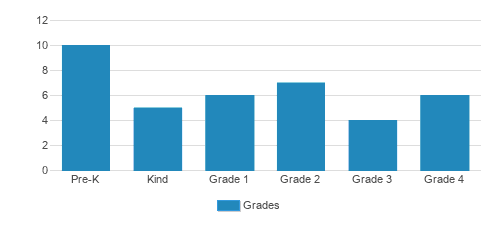Holy Trinity Episcopal School puts children first. We are a relationship based and student centered community where school feels lke home.
The mission of Holy Trinity Episcopal School is to prepare students for higher education and a meaningful life experience through a program emphasizing academic excellence, spiritual development, and social responsibility.
We serve this mission by building and maintaining a community of educators and families that are committed to supporting each other in the service of our mission while providing an inclusive and comprehensive "life-preparatory" education that is centered on students and backed by developmentally, scientifically, and emotionally sound methods for teaching and learning.
School Overview
Religious Affiliation
Grades Offered
Grades Prekindergarten-5
Learning Difference Programs
Yes
Learning Programs Supported
language-based/ mild learning differences
Year Founded
2000
School Calendar
Student Body
Total Students
38 students
Student Body Type
Co-ed
% Students of Color
60%
State avg.: 41%
Students by Grade

Academics and Faculty
Total Classroom Teachers
12 teachers
Student : Teacher Ratio
3:1
National avg.: 13:1
% Faculty w/Advanced Degree
50%
Average Class Size
8 students
List of Courses Offered
Classroom Dress Code
Formal
Uniform is required
Tuition and Acceptance Rate
Admission Deadline
None / Rolling
Tuition Notes
Ranges from $12,500 to $14,650
% on Financial Aid
40%
Acceptance Rate
90%
National avg.: 85%
Admissions Director
Contact the Director of Enrollment Management
Admissions Associate
Ms. Emilse Escalante
Extracurriculars
Total ExtracurricularsTotal Extra-curric.
7 extracurriculars
ExtracurricularsExtra-curric.
Club or Organization:
Academic Competitions, Chess, Robotics, Student
Arts and Music Programs:
Art, Music class
Recreational Athletic Programs:
Sports Camps
Academic Competitions, Chess, Robotics, Student
Arts and Music Programs:
Art, Music class
Recreational Athletic Programs:
Sports Camps
School Notes
- Early Childhood: Building strong foundations for healthy development is an important prerequisite for life-long learning. We focus on engaging our early childhood learners through innovative strategies to generate strong readiness skkills. Fostering the students' development through observation, exploration, and innovation.
- Lower and Intermediate School: Active learning and process inquiry providing our students with opportunities to build upon their pathways of learning. We engage minds through our comprehensive, research-based curriculum. Interdisciplinary studies encourage an environment that is both nurturing and challenging. We prepare students to live eduated and meaningful lives.
Source: Verified school update
Frequently Asked Questions
What is the acceptance rate of Holy Trinity Episcopal School Of Greater Houston?
The acceptance rate of Holy Trinity Episcopal School Of Greater Houston is 90%, which is higher than the national average of 84%.
When is the application deadline for Holy Trinity Episcopal School Of Greater Houston?
The application deadline for Holy Trinity Episcopal School Of Greater Houston is rolling (applications are reviewed as they are received year-round).
Recent Articles

A Parent's Guide To Understanding High School Teaching Methods
This comprehensive guide helps parents navigate the various teaching methods used in today's high school classrooms. By understanding these approaches, you'll be better equipped to support your teen's learning journey, communicate effectively with teachers, and create a complementary learning environment at home.

February 08, 2025
Social Emotional Learning: Education's Hidden SymphonyA musician's perspective on Social Emotional Learning reveals how this educational framework orchestrates success through five essential emotional competencies.

January 24, 2025
A Roadmap For Starting A Private SchoolUse this roadmap as a set of talking points with your trusted mentors and professionals to start the private school of your dreams. You're not alone. Over the years, hundreds of folks like you have had the same dream. From Quintilian to Maria Montessori to Lucy Madeira Wing, visionary educators have established schools to teach according to their beliefs and methodologies.


























